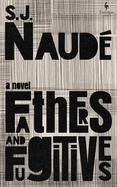
Children, from infants to adult offspring, have a rough go of it in Fathers and Fugitives, South African author S.J. Naudé's uncompromising novel composed of a quintet of connected stories. Translated from the Afrikaans by Michiel Heyns, these pieces span decades in the life of Daniel, a gay South African journalist based in London, "the British broadsheets' tattletale from the colonies." At the novel's outset, he meets two Serbian men at the Tate Modern and begins an intimate relationship with them despite suspicions that their intentions are less than noble. Years later, Daniel returns to Cape Town to reconnect with his estranged elderly father, an investment banker whose dementia has given him "a memory apparently wiped clean overnight."
Naudé's gift for gut-wrenching sequences in these early chapters is even more pronounced in subsequent entries. In one, after his father's death, Daniel has to satisfy one condition to collect his inheritance: visit his "seriously ill" cousin, Theon, in the Free State and "do his best to support and encourage" him, a task that turns out to involve caring for a 10-year-old boy with blood cancer. Even more devastating is the story in which Daniel, living on a South African farm, wants to become guardian of a three-month-old baby whose mother has died, only for a young man recently taken in by the farm's owners to complicate the prospect. Grim stuff, but Naudé's compassion for his characters makes it a worthwhile reading experience. The author's first novel to be published in the U.S., Fathers and Fugitives is an important addition to South African literature. -- Michael Magras, freelance book reviewer

